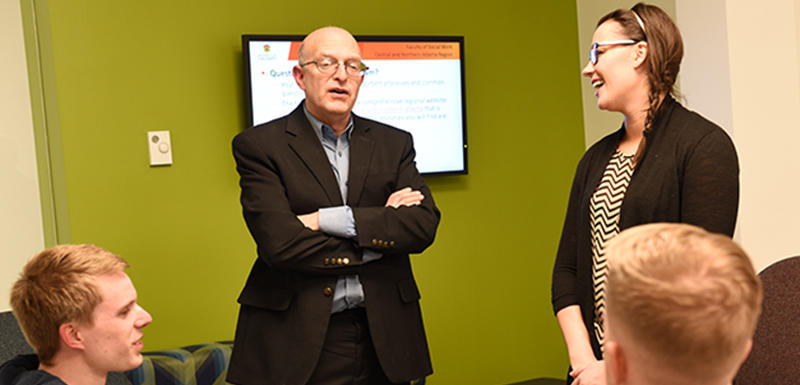April 17, 2018
Social work researcher sparks national conversation on increased quality of life for adults with autism

David Nicholas with students in social work's downtown Edmonton campus.
Dale MacMillan
For many people with autism and their families, turning 18 is sometimes described as facing a cliff.
Until they graduate high school, people with autism and other developmental disabilities are often provided with structure and purpose, filling their days with meaningful activity. For some, this can change as they enter adulthood.
“The service delivery system is decreased,” says David Nicholas, PhD, RSW. “Access to meaningful activities often substantially decreases. If that happens, individuals may be left with a lot less structure and support in their daily life. There’s a void that can happen. That's the cliff. It doesn't need to be that way. We need to think about better pathways that allow people to grow, live and thrive in community.”
A national meeting on the employment 'eco-system'
This week in Ottawa, Nicholas and colleagues are hosting a special national meeting before the Canadian Autism Spectrum Disorders Alliance’s annual Leadership Summit to consider how to create these better pathways across Canada. Nicholas, a professor and researcher with the Faculty of Social Work’s Edmonton campus, is inviting advocates, self-advocates, researchers and policy makers to look at the community “ecosystem” required to forge new possibilities and new futures for people on the autism spectrum.
“We're focusing,” says Nicholas, “on what would it look like to be a more employment-ready community for people with autism. As a community, what are our opportunities for people to go to post-secondary school? What are the employment supports and possibilities? How well equipped are employers and our chambers of commerce to include people with autism? So, for example in the city of Edmonton or the city of Calgary, what would we need to maneuver to become more employment ready?”
The importance of work
Employment – how we spend a large part of our lives as adults – is about a lot more than just work. It can be an integral part of our identity. As Nicholas explains, when people with autism don’t have the opportunity to work they can lose that identity as a working person; the feeling that they are contributing to society. They also may miss the social engagement, the friendships and relationships of the workplace.
“It’s part of the journey to and through adulthood,” says Nicholas. “Autism is diverse, and is experienced differently across the spectrum. For some, if they don't have the opportunity to work those pieces may be missing from their lives. Work matters … Work in the interest of creating good lives. While we need more data, our early research is suggesting that as people are supported in vocation, they generally feel better about their life quality. Yet, employment can be complex and challenging, and in some cases, supports are needed to assist in the journey. And for some families, this employment opportunity may vicariously support caregivers to remain in or return to their own career.”
Autism is not a childhood disease
At the end of the day we need to think differently about opportunities for adults with autism in the workplace. There may be a tendency for some in our society to think about autism largely as a childhood disease and not as a lifelong condition. Nicholas suggests that part of this thinking might reflect the fact that autism is a relatively ‘young’ condition and it’s taking time to find and understand adult-based evidence-informed practices.
“I think we're catching up,” he reflects, “but it's the community that is often pushing us forward. I think it really calls for strong, community-based interactive research where the research community, the clinical community and community providers work hand-in-hand to provide solutions. This includes individual adults with autism and their families to help come up with solutions, or ways to move forward that work at the community level with individuals as they determine their path forward.”
